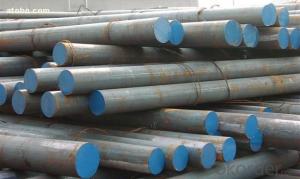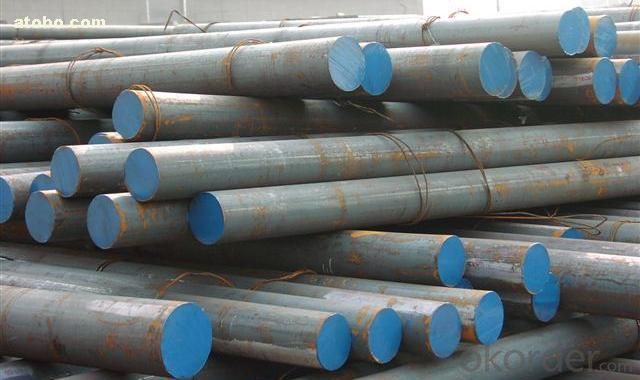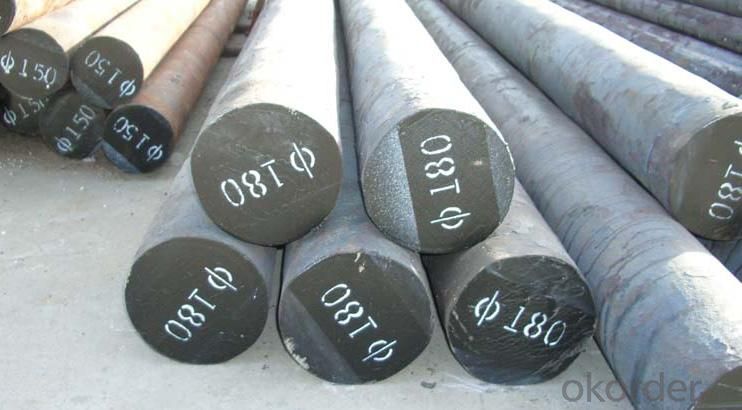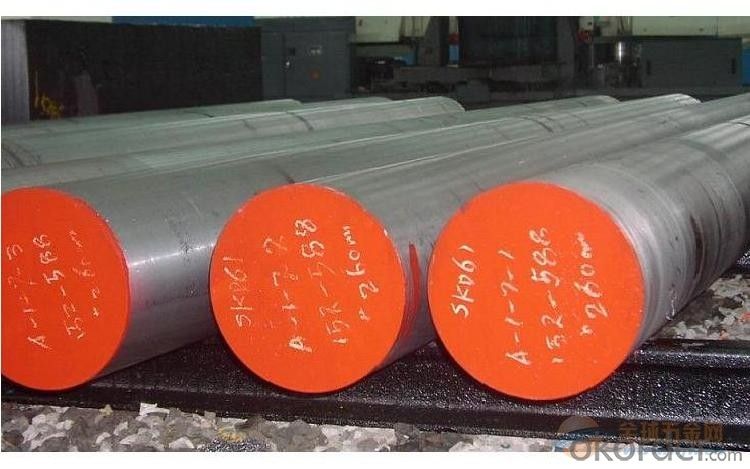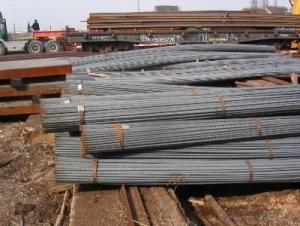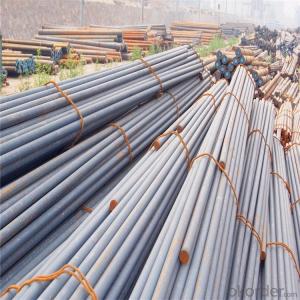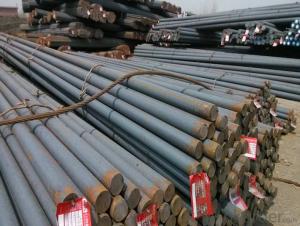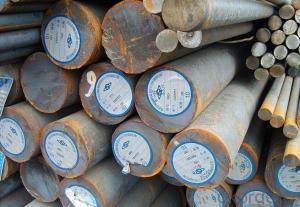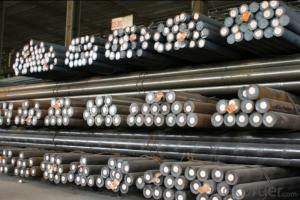SKS31 Round bar Special Steel Carbon Steel
- Loading Port:
- China main port
- Payment Terms:
- TT OR LC
- Min Order Qty:
- 25 m.t.
- Supply Capability:
- 10000 m.t./month
OKorder Service Pledge
OKorder Financial Service
You Might Also Like
Specification
Chemical Composition%(JIN)
| C | Si | Mn | Cr | Mo | P | S |
| 0.90-1.05 | ≤0.35 | 0.90-1.20 | 0.80-1.20 | 1.00-1.50 | ≤0.030 | ≤0.030 |
Available Size
| Rolled round bar | φ65-120mm × L |
| Forged round bar | φ130-290mm × L |
Heat Treatment
| Item | Temperature ℃ | Hardness |
| Anneal | 770-790 | 207-255HB |
| Quenching | 820-840 | 62-65HRC |
| Tempering | 200-280 | 55-62HRC |
Applications:
| 1.Can be used in the manufacture of cold punching, high precision punching die of cold extrusion mould and complicated shape, etc | ||||
| 2.Can be used to make small deformation, long and complicated shape of cutting tool, such as long long broach, tap, reamer, milling cutter, the gauge |


1, Your advantages?
professional products inquiry, products knowledge train (for agents), smooth goods delivery, excellent customer solution proposale
2, Test & Certificate?
SGS test is available, customer inspection before shipping is welcome, third party inspection is no problem
3, Payment Terms?
30% TT as deposit and 70% before delivery.
Irrevocable L/C at sight.
4, Trading Terms?
EXW, FOB, CIF, FFR, CNF
6, After-sale Service?
We provides the services and support you need for every step of our cooperation. We're the business partner you can trust.
For any problem, please kindly contact us at any your convenient time.
We'll reply you in our first priority within 24 hours.
- Q: Can special steel be used in the production of springs?
- Yes, special steel can be used in the production of springs. Special steel, such as alloy steel or high carbon steel, is often preferred for spring manufacturing due to its excellent strength, durability, and elasticity properties. This type of steel allows for the production of springs that can withstand high stress, maintain their shape, and provide reliable performance over an extended period of time.
- Q: How does special steel contribute to the toughness of products?
- Special steel contributes to the toughness of products through its superior strength, durability, and resistance to wear and corrosion. This high-quality steel is specifically engineered to possess exceptional mechanical properties and enhanced toughness, making it ideal for demanding applications. Its ability to withstand extreme conditions, impacts, and heavy loads ensures that products made from special steel are long-lasting, reliable, and capable of enduring harsh environments.
- Q: How is special steel used in the production of aircraft landing gear?
- Special steel is used in the production of aircraft landing gear due to its high strength, durability, and resistance to fatigue. It helps ensure the landing gear can withstand the stress and impact forces experienced during takeoff, landing, and taxiing. Additionally, special steel alloys are used to create components with precise dimensions and superior corrosion resistance, ensuring the landing gear performs reliably in various environmental conditions.
- Q: What are the factors that can affect the machinability of special steel?
- Special steel's machinability can be impacted by various factors. The composition of the steel is one of the main factors. The presence of specific elements like carbon, chromium, and nickel can significantly influence machinability. For instance, higher carbon content can lead to increased hardness and brittleness, making machining more challenging. Conversely, the addition of elements like sulfur and lead can enhance machinability by promoting chip formation and reducing friction. Machinability is also affected by the heat treatment of the steel. Different heat treatments, such as annealing or quenching, can modify the steel's microstructure, impacting its hardness and toughness. Heat-treated steels may be more difficult to machine due to their increased hardness or the presence of residual stresses. Mechanical properties of special steel, including hardness and tensile strength, also have an impact on machinability. Harder steels require greater cutting force, which can result in increased tool wear or vibration during machining. Similarly, steels with high tensile strength can pose challenges in terms of chip formation and tool life. Furthermore, machinability is influenced by the cutting conditions and machining parameters used. Factors such as cutting speed, feed rate, and depth of cut can have a significant impact on the process. High cutting speeds can lead to elevated temperatures and tool wear, while low cutting speeds may result in poor surface finish. Additionally, the choice of cutting tools, their geometry, and their coatings can also affect the machinability of special steel. Lastly, the presence of impurities or contaminants in the steel, such as non-metallic inclusions or surface defects, can have a negative impact on machinability. These impurities can cause tool wear, poor surface finish, or even tool breakage. Therefore, ensuring the quality and cleanliness of the steel is crucial for achieving good machinability. In conclusion, factors such as composition, heat treatment, mechanical properties, cutting conditions, and the presence of impurities can affect the machinability of special steel. Understanding and optimizing these factors can help improve machinability and enhance the overall performance of special steel during machining operations.
- Q: What are the different cryogenic grades of special steel?
- There are several cryogenic grades of special steel, including but not limited to, austenitic stainless steel (such as 304L and 316L), ferritic stainless steel (such as 410 and 430), and martensitic stainless steel (such as 440C). These grades are specifically designed to maintain their mechanical properties and resist brittleness at extremely low temperatures.
- Q: Is special steel suitable for electrical and electronic applications?
- Yes, special steel can be suitable for electrical and electronic applications. Special steel refers to steel alloys that have been specifically designed to possess certain properties or characteristics that make them suitable for particular applications. In the case of electrical and electronic applications, special steel can offer various advantages. One of the key requirements for electrical and electronic applications is high electrical conductivity. While steel is not typically known for its electrical conductivity, certain special steel alloys can be engineered to have improved electrical conductivity. For example, stainless steel can be alloyed with elements such as nickel or copper to enhance its electrical conductivity, making it suitable for applications where electrical current needs to flow efficiently. Another important factor for electrical and electronic applications is magnetic properties. Some special steel alloys exhibit excellent magnetic properties, making them ideal for applications such as transformers, motors, and generators. These alloys can possess high magnetic permeability, low coercivity, and low hysteresis losses, which are crucial for efficient energy transfer and minimal power loss. Furthermore, special steel can also provide excellent corrosion resistance, which is essential in electrical and electronic equipment that may be exposed to moisture or harsh environments. Stainless steel, for instance, is highly resistant to corrosion, ensuring the longevity and reliability of the equipment. In summary, special steel can be suitable for electrical and electronic applications when it possesses the necessary electrical conductivity, magnetic properties, and corrosion resistance. By choosing the appropriate special steel alloy, manufacturers can ensure the performance, durability, and reliability of electrical and electronic equipment.
- Q: How is nitriding steel used in surface hardening processes?
- Nitriding steel is used in surface hardening processes by introducing nitrogen into the steel's surface, resulting in the formation of a hard and wear-resistant outer layer. This process enhances the steel's mechanical properties, such as hardness, fatigue strength, and wear resistance, making it ideal for applications where high durability and resistance to abrasion are required.
- Q: What are the different coating techniques for special steel?
- There are several different coating techniques that can be used for special steel to enhance its properties and protect it from corrosion or wear. Some of the commonly used coating techniques include: 1. Electroplating: In this technique, a thin layer of metal is deposited onto the surface of the steel using an electric current. This can be done with various metals such as zinc, nickel, or chrome, depending on the desired properties of the coated steel. 2. Hot-dip galvanizing: This technique involves immersing the steel in a molten zinc bath, which forms a protective layer on the surface. Hot-dip galvanizing is commonly used for outdoor applications, as it provides excellent corrosion resistance. 3. Powder coating: In this technique, a dry powder is applied to the surface of the steel and then heated to form a protective coating. Powder coating offers a wide range of colors and finishes and provides both corrosion and wear resistance. 4. Thermal spraying: This technique involves heating a coating material, such as zinc or aluminum, to a high temperature and then spraying it onto the steel surface. Thermal spraying is commonly used for high-temperature applications, as it provides excellent resistance to heat and corrosion. 5. PVD coating: Physical vapor deposition (PVD) is a technique where a thin film of metal is deposited onto the steel surface through a vacuum process. PVD coatings can provide various properties such as hardness, wear resistance, and decorative finishes. 6. Carbonitriding: This is a surface hardening technique where the steel is heated in a furnace containing a carbon and nitrogen-rich atmosphere. Carbonitriding forms a hard, wear-resistant layer on the steel surface, improving its durability. These coating techniques offer different advantages and are chosen based on the specific requirements of the application. By applying these coatings, special steel can be made more resistant to corrosion, wear, and other forms of degradation, extending its lifespan and enhancing its performance in various industries.
- Q: What are the properties of stainless tool steel?
- Stainless tool steel possesses several key properties that make it a popular choice for various applications. Firstly, it has excellent corrosion resistance, making it resistant to rust and staining. This property allows stainless tool steel to maintain its integrity and durability in harsh environments or when exposed to moisture. Additionally, stainless tool steel exhibits high hardness and wear resistance, enabling it to withstand heavy use and retain its sharpness for extended periods. It also has good toughness and impact resistance, ensuring it can handle intense forces without fracturing or breaking. These properties make stainless tool steel suitable for manufacturing tools and components used in industries such as automotive, aerospace, and cutlery.
- Q: How does heat-resistant steel perform in high-temperature applications?
- Heat-resistant steel performs exceptionally well in high-temperature applications. It exhibits remarkable strength and stability, allowing it to withstand extreme heat without losing its structural integrity or mechanical properties. This type of steel maintains its resistance to oxidation, corrosion, and creep, making it an ideal choice for various industries such as aerospace, power generation, and petrochemical. Its ability to retain its strength and shape under extreme heat conditions makes it a reliable material for applications where high temperatures are involved.
Send your message to us
SKS31 Round bar Special Steel Carbon Steel
- Loading Port:
- China main port
- Payment Terms:
- TT OR LC
- Min Order Qty:
- 25 m.t.
- Supply Capability:
- 10000 m.t./month
OKorder Service Pledge
OKorder Financial Service
Similar products
Hot products
Hot Searches
Related keywords
